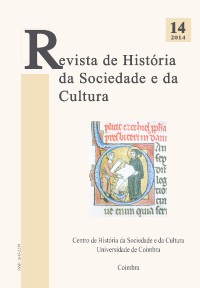Please use this identifier to cite or link to this item:
https://hdl.handle.net/10316.2/39369| Title: | O Antifeminismo e o questionar do género no limiar dos séculos XIX-XX: dos argumentos teóricos e epistemológicos à prática social | Authors: | Marques, Gabriela Mota | Keywords: | Antifeminism;Gender;Social representations;Antifeminismo;Género;Representações sociais | Issue Date: | 2014 | Publisher: | Centro de História da Sociedade e da Cultura | Abstract: | Os paradigmas e as representações social e moralmente convencionadas para as mulheres
distanciam-se dos seus verdadeiros comportamentos e atributos tidos como transgressores
da norma, dando origem a ideias, a [pre]conceitos e a imagens nem sempre favoráveis
sobre ser feminino, do mesmo modo que colocam em causa os papéis de género. É esse o
território propício para o antifeminismo associado à oposição ao feminismo e às intenções de
emancipação e de reivindicação de direitos, mas também às interpretações, aos estereótipos
e às tradições enraizadas sobre a natureza imperfeita e a inferioridade femininas.
Os receios e as desconfianças face à atuação da mulher, ao seu pretenso poder e a uma
possível inversão sexual de funções ou o próprio desconhecimento sobre o universo feminino
estão presentes no modo de pensar e de atuar da sociedade. De igual forma traduzem os
diferentes níveis e a expressividade que o antifeminismo assume e que são reflexo da influência
da igreja, da ciência e de ideologias na preservação dos poderes e valores instituídos, bem
como na definição das funções e dos lugares sociais do género. The paradigms and the representations socially and morally set for women are clearly different from their real behaviors and attributes, which are seen as transgressing the norms. This gives rise to some unfavorable ideas, images and [pre]conceptions about the female being that, at the same time, call into question the gender roles. This is the fertile ground for antifeminism linked to the opposition to feminism and to the female intentions of emancipation and vindication of rights. It also encourages the rooted interpretations, stereotypes and traditions based on the imperfect nature and the inferiority of women. The fears and suspicions arising from the actions of women, their alleged power, an eventual reversal of sexual roles or even the ignorance of the female universe are present in society’s way of thinking and acting. Likewise, they show the different levels and the expressiveness that antifeminism assumes and which reflect the influence of the Church, of Science and of ideologies in the preservation of the established powers and values, as well as in the definition of the social roles and places of gender. |
URI: | https://hdl.handle.net/10316.2/39369 | ISSN: | 1645-2259 2183-8615 (digital) |
DOI: | 10.14195/1645-2259_14_11 | Rights: | open access |
| Appears in Collections: | Revista de História da Sociedade e da Cultura |
Files in This Item:
| File | Description | Size | Format | |
|---|---|---|---|---|
| o_antifeminismo_e_o_questionar_do_genero.pdf | 1.89 MB | Adobe PDF |  |
Items in DSpace are protected by copyright, with all rights reserved, unless otherwise indicated.
